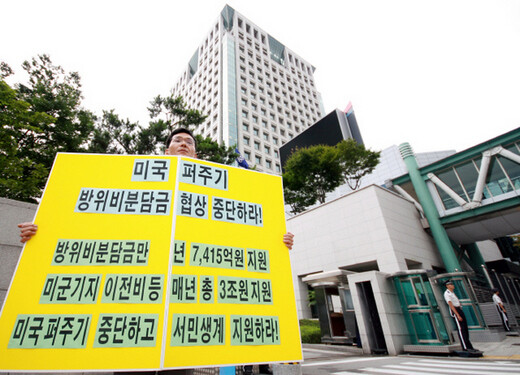hankyoreh
Links to other country sites 다른 나라 사이트 링크
U.S. presses S. Korea to assume greater cost-sharing burden

South Korea and the United States held their first round of negotiations with high-level officials on July 21 in Washington to sign a special agreement on how to share the cost of maintaining U.S. troops stationed in South Korea.
During the day-long talks, the United States was believed to have demanded that South Korea increase its cost-sharing ratio to 50 percent, from the current 42 percent. It was also reported that the United States had asked South Korea to divert its share of the burden toward funding the expansion of the U.S. military base to Pyeongtaek, about 65 kilometers southeast of Seoul. Instead, South Korea was reported to have said that it wanted to pay for the cost of maintaining U.S. troops in goods, rather than in cash.
The talks were led by Cho Byeong-je, the director of the Ministry of Foreign Affairs and Trade’s U.S. bureau, and Jackson McDonald, the ambassador for defense cost-sharing negotiations at the U.S. State Department.
The South Korean government has financed the U.S. military presence here since 1991. Defense costs are broken down into four parts: wages for South Korean workers hired by the U.S., costs associated with the construction of military facilities, costs related to enhancing the allies’ defenses and military supplies.
Since South Korea began funding the U.S. military, Seoul has increased its cost-sharing burden by about 10 percent annually. This year, South Korea was required to pay a total of 741.5 billion won (US$728.6 million). The high-level talks in Washington were aimed at negotiating how to share the cost from 2010.
As for the U.S. request to divert the cost-sharing funds to help finance the relocation of the U.S. military base to Pyeongtaek, the National Assembly’s committee for unification, diplomacy and trade had already demanded in March that the South Korean government “come up with measures to improve the situation because funds for the cost-sharing program are already being used for relocation of the U.S. base.” The parliamentary committee’s reaction came as it was giving preliminary approval to a pact to share the cost of stationing U.S. troops for 2007 and 2008.
Under a mutual agreement between the two nations on land management planning for the expansion of the U.S. military base to Pyeongtaek, made in April 2003, the cost of relocating the U.S. 2nd Infantry Division to Pyeongtaek is to be shouldered by the U.S. government. In spite of this, however, the National Assembly committee decided to accept that the United States had already begun to use South Korea’s portion of the cost-sharing burden to finance the expansion of the base.
The South Korean government is believed to have made a compromise by letting the United States divert the funds it has already paid for the cost-sharing program and is beginning to pay its share of the cost in goods, not cash, to improve transparency in spending in the future. In addition, the United States will likely be required to provide details on how the funds are disbursed. However, the United States was reported to have opposed South Korea’s proposal, saying it could undermine its freedom to use the funds as necessary.
Please direct questions or comments to [englishhani@hani.co.kr]
Editorial・opinion
![[Guest essay] The real reason Korea’s new right wants to dub Rhee a founding father [Guest essay] The real reason Korea’s new right wants to dub Rhee a founding father](https://flexible.img.hani.co.kr/flexible/normal/500/300/imgdb/original/2024/0423/8317138574257878.jpg) [Guest essay] The real reason Korea’s new right wants to dub Rhee a founding father
[Guest essay] The real reason Korea’s new right wants to dub Rhee a founding father![[Column] ‘Choson’: Is it time we start referring to N. Korea in its own terms? [Column] ‘Choson’: Is it time we start referring to N. Korea in its own terms?](https://flexible.img.hani.co.kr/flexible/normal/500/300/imgdb/original/2024/0423/3617138579390322.jpg) [Column] ‘Choson’: Is it time we start referring to N. Korea in its own terms?
[Column] ‘Choson’: Is it time we start referring to N. Korea in its own terms?- [Editorial] Japan’s rewriting of history with Korea has gone too far
- [Column] The president’s questionable capacity for dialogue
- [Column] Are chaebol firms just pizza pies for families to divvy up as they please?
- [Column] Has Korea, too, crossed the Rubicon on China?
- [Correspondent’s column] In Japan’s alliance with US, echoes of its past alliances with UK
- [Editorial] Does Yoon think the Korean public is wrong?
- [Editorial] As it bolsters its alliance with US, Japan must be accountable for past
- [Guest essay] Amending the Constitution is Yoon’s key to leaving office in public’s good graces
Most viewed articles
- 1[Guest essay] The real reason Korea’s new right wants to dub Rhee a founding father
- 2Why Korea shouldn’t welcome Japan’s newly beefed up defense cooperation with US
- 3Terry Anderson, AP reporter who informed world of massacre in Gwangju, dies at 76
- 4[Column] ‘Choson’: Is it time we start referring to N. Korea in its own terms?
- 5[Column] The clock is ticking for Korea’s first lady
- 6Opposition calls Yoon’s chief of staff appointment a ‘slap in the face’
- 7Senior doctors cut hours, prepare to resign as government refuses to scrap medical reform plan
- 8New AI-based translation tools make their way into everyday life in Korea
- 9[Editorial] Japan’s rewriting of history with Korea has gone too far
- 10[Column] Are chaebol firms just pizza pies for families to divvy up as they please?